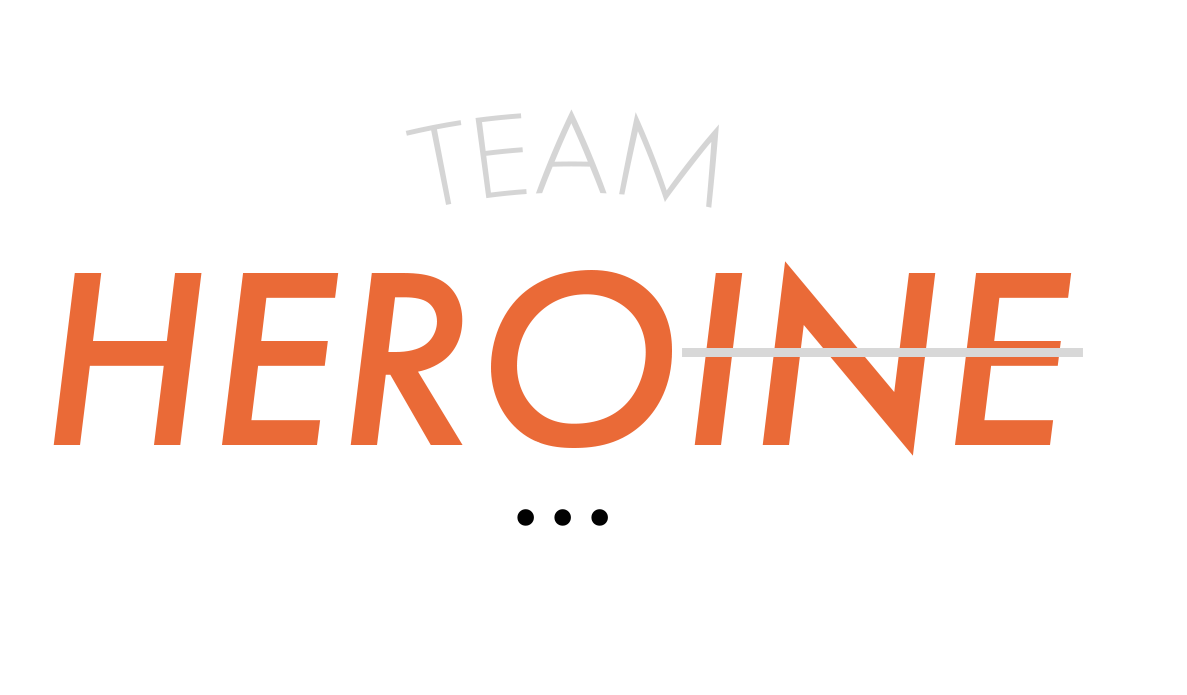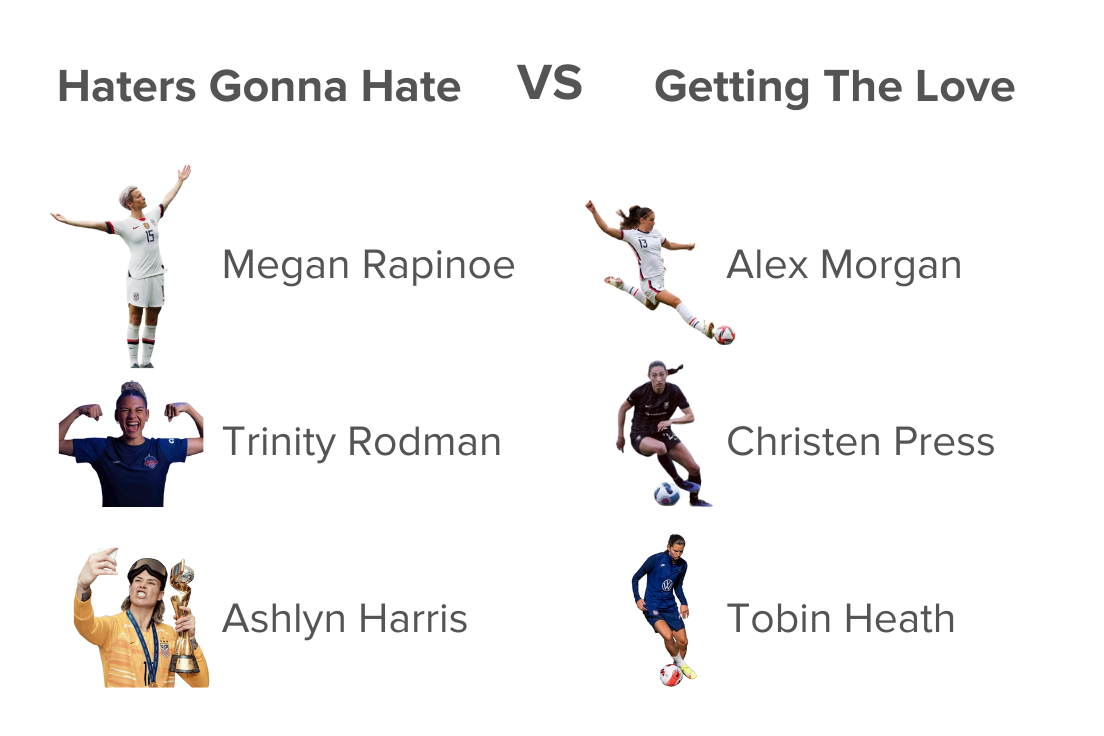Team Heroine Positive Vibes Tracker: Part 2 - NWSL Players
Welcome to Part 2 of a 2-part series about the Team Heroine Positive Vibes Tracker which takes a look at social media sentiment around ‘The Players’ in the National Women’s Soccer League (NWSL) Challenge Cup.
In partnership with Areto Labs we evaluated the ‘positive vibes’ surrounding the NWSL teams in Part 1 HERE which also outlined how the Team Heroine Positive Vibes Tracker worked and how Areto Listener evaluated the ‘good’, the ‘meh’ and the ‘ugly’ comments shared on the social media accounts of the NWSL teams and players during their pre-season Challenge Cup.
Below is a collection of the most interesting things I’ve enjoyed uncovering around the 25 players that we tracked in the NWSL Challenge Cup.
Players getting the most love and hate
Across 25 players that we tracked (those with a minimum of 500 comments from 27 March to 7 April), it was perhaps not surprising to see players regarded as the biggest names or ‘most outspoken’ within the community copping the most ‘hate’.
US national team star and activist, Megan Rapinoe was the biggest target by ‘Haters’ with Rookie of the Year, Trinity Rodman coming in just behind her in second place.
Interestingly, winner of SportsPro’s 55 Most Marketable Athletes, Ashlyn Harris picked up bronze in terms of players getting the least love in the league. This re-enforces the need for brands who want to align with certain athletes to also analyze public sentiment around these athletes and not just make decisions based purely on Reach and Engagement metrics.
On the flip side and getting the most ‘Love’ from the community was USWNT and San Diego striking sensation, Alex Morgan.
Following her were known fan-favourites, Christen Press who joined Angel City for their inaugural NWSL season and Tobin Heath whose NWSL rights are held rights by Racing Louisville.
Let’s take a further look at what may be driving the ‘hater vibes’ towards these three players.
Veteran & rookie on the recieving end of hater vibes
Megan Rapinoe is the most well-known or at least the most ‘outspoken’ when it comes to various issues and someone who is not afraid to use their voice for change. She is the face of equality which can draw a lot of attention (both good and bad) and when I speak to people or look at comments around her social media, people either love her or hate her. Perhaps those that have a negative view of her or her views are more inclined to make the effort to vocalise this on social media and hence why she attracts the highest toxicity of comments among the players we tracked.
However, we can’t pin the ‘hater vibes’ on the fact that certain players have been around for longer and hence may be getting more flack because they are more well known.
Trinity Rodman is just 19 years old and only played her first NWSL season last year. She is a class act on the field and was named 'Rookie of the Year’ and yet was second in line to receive the most ‘negative vibes’.
My take on why Rodman was on the receiving end of a number of toxic comments was down to an off-field incident.
She found herself in a spat with widely followed, goalie and wife of Ali Kriger, Ashlyn Harris. Read on to find out which of these two came off worse around this Twitter face-off.
Ashlyn Harris comes out on top against Trinity Rodman
Ashlyn Harris and Trinity Rodman got into an ugly Twitter battle when Harris defended wife, Ali Krieger after Rodman joked about Kriger falling over her own feet thanks to the skills of her Washington Spirit teammate in a 1-on-1 when the two teams played each other.
I isolated the 48-hours where comments peaked around this Twitter incident and tracked the change in ‘vibes’s directed at both these players.
Ashlyn Harris may have won this battle over Rodman with the ‘positive vibes’ she attracts decreasing at a lower rate of 4.5% when compared to Rodman who saw a percentage decrease in ‘positive vibes’ of 7.4% but the more important outtake is how unnecessary conflict between players impacts negatively on both parties. If I was an athlete’s ‘brand’ or talent manager who wanted to see the highest positive sentiment around my players, I would recommend avoiding any unnecessary Twitter wars with other players.
How women’s sport can benefit from our Positive Vibes Tracker
So why does all this matter and how can the Team Heroine Positive Vibes tracker and Areto Labs Listener technology tool benefit the women’s sport community….we already know there are trolls out there who target female athletes and women’s sport with toxic comments on social media.
Here’s who the Positive Vibe Tracker can help and how:
1. Sponsors
Sponsors that want to align with teams or athletes that are on the receiving end of more ‘positive vibes’ can better make decisions about who to sponsor
Risk-adverse brands that want to avoid sponsoring polarising teams or players who attract more regular occurrences of ‘toxicity’ can re-direct their sponsorships into different players and teams
2. marketing Managers
Marketing Managers who want to better understand what type of content and activities result in social media spikes and how the public’s mood changes around certain posts
Marketing Managers who want to understand what content to ‘lean in to’ in order to generate more positive reaction
3. Commercial managers
Commercial Managers who want to incorporate the sponsorship value of ‘positive vibes’ that their team or athletes attract from the community i.e. as the Commercial Manager of San Diego Wave who received the most ‘positive vibes’ out of all 12 teams, I would want to use this as a drawcard to attract new sponsors and command higher sponsor fees
Commercial Managers who want to include ‘positive vibes’ and community sentiment alongside other metrics (viewership, social media engagement, crowd attendance) in their valuation and sponsor analysis
4. Athletes
Athletes who see themselves as ‘Content Creators / Influencers and want to understand what content elicits more ‘positive vibes’ from the community
Athletes who want to be aware of when they may be the target of more ‘toxic’ comments in order to manage their mental health accordingly i.e. not looking at Twitter comments for the day when they are likely to be the recipient of ‘more hate’
5. Wellbeing coaches
Coaches and staff responsible for athlete wellbeing can monitor toxicity levels and gain awareness of those players who are more likely to be on the receiving end of ‘hate’ so they can ensure they better check-in with those players and provide extra support where needed
If you would like to better understand how our Positive Viber Tracker can help you or your organisation, get in touch rebeecca@teamheroine.com and check out Areto Labs for more info.
Don’t forget to sign up to my monthly newsletter to get more women’s sport marketing & sponsorship insights.



